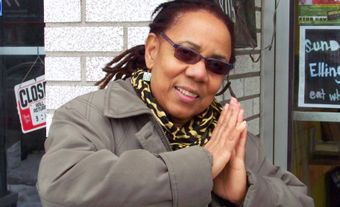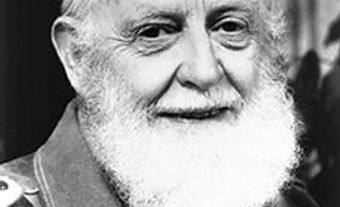
Lionel Kearns
Lionel Kearns, poet and professor (born 6 February 1937 in Nelson, BC). In 1955, Lionel Kearns enrolled at the University of British Columbia, where Earle Birney advised his thesis on prosody and verse notation. With fellow students George Bowering, Frank Davey, Fred Wah and others, Kearns became involved with TISH, a poetry newsletter reflecting their enthusiasm for American poets such as Charles Olson and Robert Duncan. Kearns then completed an MA in Structural Linguistics at London University and researched West Indian English dialect on the island of Trinidad. From 1966 to 1986 he was a professor at Simon Fraser University. In 1988 he became the first instructor for Writer-in-Electronic Residence (WIER), an online, interactive creative writing program. Kearns is a key figure among the Canadian avant-garde poets of the 1960s, a pioneer of interactive communications technology in teaching poetry, and an early proponent of digital poetry.
An offshoot of Kearns' master's thesis is Songs of Circumstance (1962). This chapbook of visually striking poems is written as "stacked verse," a system of notating rhythms to highlight the poems' musicality. The most heavily stressed syllable of each line is centered on the page, with a vertical line running down the stack of stresses like the metrical backbone of the poem.
Pointing (1967), Kearns' first full-length collection, initiates major themes such as poverty and homelessness, which continue to be present in his work, and exhibits characteristic irony, as when he addresses the representation of First Nations peoples in Hollywood westerns. Several poems are metapoetic (referring to the act of writing poetry), as in one that contemplates the dangers of over-thinking poetry, concluding that "the authentic dance / is the wobbly stance / of the living man" ("Poetic").
One of Kearns' pivotal works is By the Light of the Silvery McLune: Media Parables, Poems, Signs, Gestures, and Other Assaults on the Interface (1969). The punning title reveals Kearns' fascination with Marshall McLuhan's ideas about the effects of media communications on society and the possibilities of new electronic media. Exemplifying this preoccupation is "A Collage Education," which exposes television's ironic juxtaposition of African-American poverty and pharmaceutical painkillers. A much-anthologized concrete poem, "The Birth of God," was later adapted for film as a "cine-poem" by Kearns, Gordon Payne and Peter Huse. The poem and film are recognized as ground-breaking works anticipating the later explosion of interest in digital poetry. Kearns' engagement with media culture also infuses poems of postcolonial irony, as in "Bleeding," in which Mexican Day of the Dead ceremonies are marred by arrogantly voyeuristic tourists and the intrusion of travelogue filmmakers.
Kearns continues to examine representations of indigenous cultures in his experimental work Convergences (1984). He weaves together two of his major themes: meta-poetry and the history of imperialism. In prose incorporating historical documents and illustrations, Kearns narrates Captain James Cook's last voyage of exploration, during which he encountered the Mowachaht of British Columbia and the Hawaiian Islands people. This historical tale alternates with passages referencing Kearns' own life, his writing of the book, and the imagined reactions of readers. Mingling these various discourses, Kearns explores correspondences and tensions between represented and ongoing history.
Two noteworthy selected editions of Kearns' work are Ignoring the bomb: new and selected poems (1982) and A few words will do (2007). Kearns complexly interweaves themes of meta-poetry, media, consumerism, postcolonialism, and autobiography; he encourages us to look beyond the poem's subject and to question the roles of author and reader, to interrogate one's place within a postcolonial world, and to become aware of the effects of media and consumerism. Kearns began his career at the matrices of innovative trends in poetry and revolutionary thought about culture and history, and he is now recognized as an early and significant poet in the history of Canadian avant-garde literature.

 Share on Facebook
Share on Facebook Share on X
Share on X Share by Email
Share by Email Share on Google Classroom
Share on Google Classroom


